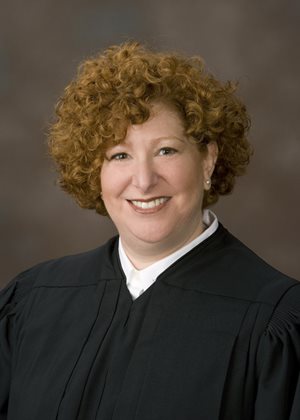 TOPEKA—Melissa Taylor Standridge, Leawood, will be sworn in as a justice of the Kansas Supreme Court at 9 a.m. Monday, December 14.
TOPEKA—Melissa Taylor Standridge, Leawood, will be sworn in as a justice of the Kansas Supreme Court at 9 a.m. Monday, December 14.
Chief Justice Marla Luckert will preside over the ceremony, which will take place by videoconference and be broadcast live on the Supreme Court YouTube channel.
When the swearing-in ceremony concludes, Standridge will join the other justices in hearing cases on the court's December 14–18 docket.
Governor Laura Kelly appointed Standridge to fill the vacancy created by Justice Carol Beier's September 18 retirement.
Standridge has been a Kansas Court of Appeals judge since 2008 and said she enjoys the work.
"I like the intellectual challenge provided by the legal issues, the public service aspect, and the belief that adherence to the rule of law plays an absolutely essential function in a free society," she said.
Before becoming a judge, she was chambers counsel for two federal judges—U.S. District Judge Elmo Hunter and U.S. District Magistrate Judge David Waxse—and a private practice attorney at the Shook, Hardy & Bacon law firm.
"Judge Hunter's dedication to duty was an inspiration to me, and I know he was an inspiration to many others. He taught me early on that a certain humility should characterize the judicial role and that judges and justices are servants of the law, not the other way around," she said.
"And while working for Judge Waxse, I learned the key points of a judge's focus need to be the rule of law, equal justice, and judicial excellence to promote public trust and confidence in our system of justice," she added.
After graduating in 1984 with a bachelor's degree in business administration from the University of Kansas, Standridge worked for several years in business before going to law school.
"I wanted to make the world a better place by protecting clients and safeguarding the rule of law," she said.
She graduated cum laude in 1993 from the University of Missouri-Kansas City School of Law.
She is a strong advocate of the judiciary and the key role it plays as the third branch of government.
"Judicial independence means the judiciary should be independent from private or partisan interests and remain committed to the rule of law and the protection of individual rights and liberties," she said.
That system directly affects Kansans, Standridge said.
"The judicial branch provides everyday Kansans a system in which they can resolve disputes, protect their individual rights, and benefit from checks and balances on the other branches of government," she said.
She has received numerous awards during her career. Among them are the Sandra Day O'Connor Award for Professional Service from the American Inns of Court, the Carol Foreman Medal of Civility from the Kansas Women Attorneys Association, and the Diversity Award from the Kansas Bar Association.
Standridge is a foster and adoptive parent, was involved with Big Brothers Big Sisters, and volunteers for numerous community service agencies.
In-person swearing-in ceremonies
Usually swearing-in ceremonies take place in the Kansas Supreme Court courtroom filled with guests, including current and past Supreme Court justices and Court of Appeals judges. Other guests include federal judges, district court judges, members of the legislative and executive branches, law related organizations, and the justice's family members and friends. Current restrictions on mass gatherings make an in-person ceremony impractical.
Merit-based selection process
Supreme Court justices are appointed through a merit-based nomination process that Kansans voted to add to the Kansas Constitution in 1958.
When there is a vacancy on the court, the Supreme Court Nominating Commission has 60 days from the date the vacancy occurs to submit names of three qualified nominees to the governor.
After receiving the list of nominees, the governor has 60 days to appoint one of them to the court.
Retention elections
After a new justice serves one year on the court, he or she must stand for a retention vote in the next general election to remain in the position. If retained, the justice serves a six-year term.
Nominating commission
The Supreme Court Nominating Commission is an independent body. Four of its members are appointed by the governor and represent each of the state’s four congressional districts. These appointees are not attorneys. Four more members are attorneys elected by other attorneys within each of the congressional districts. The commission chair is an attorney elected by attorneys in a statewide vote.